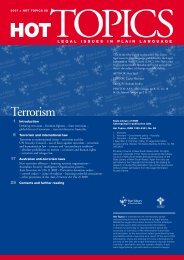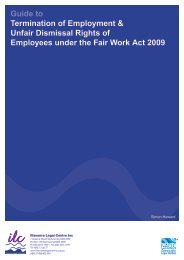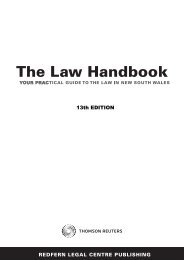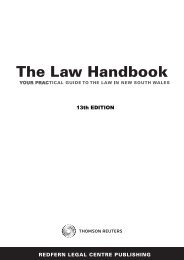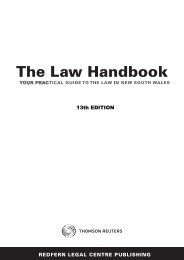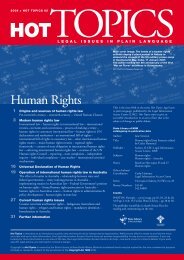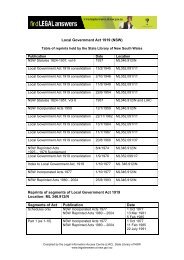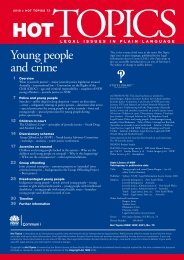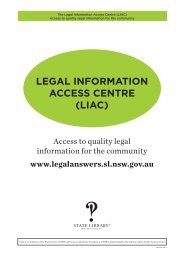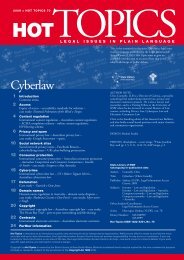Shelter - Hot Topics 57 - Legal Information Access Centre - NSW ...
Shelter - Hot Topics 57 - Legal Information Access Centre - NSW ...
Shelter - Hot Topics 57 - Legal Information Access Centre - NSW ...
- No tags were found...
You also want an ePaper? Increase the reach of your titles
YUMPU automatically turns print PDFs into web optimized ePapers that Google loves.
caSe STudieS frOm THe aNTi-diScrimiNaTiON bOardthe following cases are examples of complaints of discrimination in relation to accommodation, and how theanti-Discrimination Board helped resolve the complaints. Because these resolutions were conciliated, they are notbinding precedents in the way decisions of superior courts are.RACe DiSCRiMiNATiON:an aboriginal man alleged that his application for accommodation was not progressed on the ground of his race. hesaid that he was advised that he would need to go on a three-month trial lease if he was the successful applicant.his application was ultimately rejected and the agent refused to provide with reasons for the rejection. aftercomplaining to the Board about race discrimination, he accepted a $4000 payment in settlement of his complaint.DiSABiLiTy DiSCRiMiNATiON:tenants of a housing provider complained to the Board that their current accommodation was cold, damp andmouldy, and that they could not live there because they had asthma and arthritis. they alleged that their landlordshould have been able to transfer them to more suitable accommodation, but that their various requests for transferhad not resulted in a more suitable property being identified. the housing provider said that they’d done everythingpossible to try to accommodate the tenants’ request but that suitable properties were simply not available in theright location. the matter was resolved at the Board when the parties agreed to detail the tenants’ specific housingneeds and place them on the list for priority transfer.source: http://www.lawlink.nsw.gov.au/lawlink/adb/ll_adb.nsf/pages/adb_casescOmmONWealTH aNTi-diScrimiNaTiONlegiSlaTiONThere are four pieces of Commonwealth legislation that deal with discrimination:> the Racial Discrimination Act 1975;> the Sex Discrimination Act 1984;> the Disability Discrimination Act 1992;> the Age Discrimination Act 2004.Each of these Acts is based on international human rights obligations into which Australia has entered. Under the Human Rights and Equal Opportunity Commission Act 1986, the Human Rights and Equal Opportunity Commission (HREOC) investigates and conciliates complaints made under the Commonwealth’s antidiscriminationlegislation.The Commonwealth Acts, in a similar way to each of the parts of the New South Wales Anti-Discrimination Act 1977, set out grounds for discrimination (the Sex Discrimination Act 1984 covers discrimination on grounds of marital status, pregnancy and prospective pregnancy, as well as sex). Each Act also makes specific provisions in relation to discrimination in the provision of accommodation and exemptions, again in fairly similar terms to the Anti-Discrimination Act 1977. However, there are some differences – for example,the Disability Discrimination Act 1992 includes inits definition of unlawful discrimination ‘refusing topermit the … person to make reasonable alterationsto the accommodation,’ provided that the person willpay for the alteration, not alter any other occupant’saccommodation, and restore the accommodation toits original condition on leaving (s 25(2)(d)). There aredifferences in the exemptions, too: the Sex DiscriminationAct 1984, the Disability Discrimination Act 1992 and theAge Discrimination Act 2004 exempt accommodationthat is shared with the landlord or relative only when it isfor three persons or fewer (under the Anti-DiscriminationAct 1977, the number of persons is six or fewer); theRacial Discrimination Act 1975 exempts accommodationshared with the landlord or their relatives regardlessof how many persons live there. Finally, there are alsodifferences between the remedies that may be availableto a complainant if the complaint is not resolved byconciliation.Because the State and Commonwealth anti-discriminationregimes cover many of the same grounds, a person whohas been discriminated against may be able to complainunder either regime.24HOT TOPICS <strong>57</strong> > <strong>Shelter</strong>



